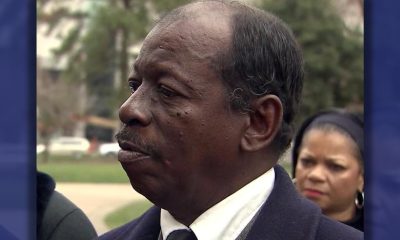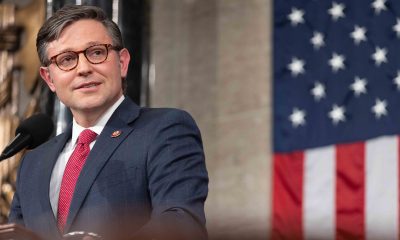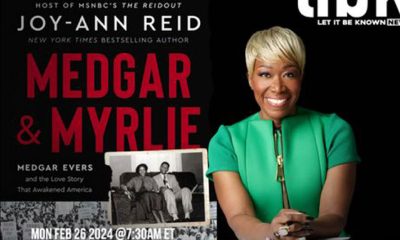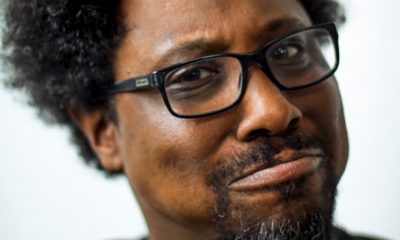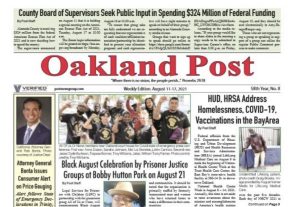Op-Ed
How Dick Gregory Got his Hollywood Star

By George E. Curry
NNPA Columnist
Activist/ SiriusXm satellite radio host Joe Madison was helping on a campaign to get the Four Tops a star on the Hollywood Walk of Fame when he noticed another serious omission from the world-famous tribute to entertainers.
“You go to Hollywood and Gene Autry had five (one in each category). Big Bird had a star. When we did our campaign to get the Four Tops a star, I said, ‘My God, Dick Gregory doesn’t have a star.” In 1997, seven years after getting inducted into the Rock and Roll Hall of Fame, the Four Tops, – whose 1960s hits included such songs as “Baby I Need Your Loving,” “Ask the Lonely,” “I Can’t Help Myself” and “It’s the Same Old Song” – finally were awarded a star.
But Madison couldn’t get over the fact that Dick Gregory, the first Black comedian to earn more than $1 million a year yet gave up his career to actively support Dr. Martin Luther King, Jr.’s Southern Christian Leadership Conference (SCLC) and the Student Nonviolent Coordinating Committee (SNCC), hadn’t been recognized with a star on the Hollywood Walk of Fame.
“You can walk down there and not see Dick Gregory, but you’ll see Eddie Murphy, Richard Pryor and Whoopi Goldberg,” Madison said. “ I don’t know of any entertainer from the era who sacrificed more than Dick Gregory.”
About 10 years ago, he set out to change that.
“The first time we tried it, we filled out a very complicated application and the committee – the Hollywood Chamber of Commerce – didn’t award him a star,” Madison remembered. “I tried again and they still didn’t accept it. We let some time go by. This time (in 2013), I said, ‘Look, this is ridiculous.’ That’s when I got Sheila Moses, who helped write Dick’s last book, help word the application. E. Faye Williams, president of the National Congress of Black Women, helped and we put the application together and sent it in. Finally, the committee accepted him in the class of 2015.”
At the age of 85, Gregory joins a class that includes Kool & the Gang, Pharrell Williams, Will Ferrell and Amy Poehler. The induction ceremony was carried live Monday on national and international television.
Before Gregory could receive his honor, $30,000 had to be submitted on his behalf to cover the creation and installation of his star as well as maintenance of the Walk of Fame.
A small group of supporters got together to strategize. The first idea was to reach out to some of the biggest names in Hollywood who could write the $30,000 within the blink of the eye, including fellow comedian Bill Cosby and Hugh Hefner, who lifted Gregory to national stardom in 1961 by regularly booking him at Chicago’s Playboy Club. The second idea was to identify 30 people willing to donate $1,000 each.
But Joe Madison had a better idea.
He recalled, “I got with Sherry [his wife and radio producer] and said, ‘Let’s go on the air and make this very simple – 1,000 people with $30. If I don’t have 1,000 listeners who can afford $30, I need to be off the air.’”
Madison didn’t need to get off the air – the $30,000 goal of the Dick Gregory Hollywood Star Fund was reached in two weeks.
“What it really speaks to is Dick,” he said. And it’s hard to find anyone who has not been touched by Dick Gregory in some way.
As a teenager growing up in Tuscaloosa, Ala., I remember hearing him speak at First African Baptist Church, the nerve center of our efforts to desegregate my hometown. I was stunned by the way he boldly attacked segregation, keeping us laughing along the way.
He would say, “The last time I was down South I walked into this restaurant and this White waitress came up to me and said, ‘We don’t served colored people here.’ I said, ‘That’s all right. I don’t eat colored people. Bring me a whole fried chicken.’”
And there was this one: “Segregation is not all bad. Have you ever heard of a collision where the people in the back of the bus got hurt?”
There was simply no one else like Dick Gregory. And callers into Joe Madison’s radio show shared their special memories.
Madison remembers the call-ins: “One guy, who’s a doctor in New Orleans, said, ‘Dick Gregory spoke at Xavier University. I was a student and I still have the notes from that speech.’ He was in school in the 70s.
“An executive from Caterpillar in Peoria, Ill. said, ’I am the only Black sitting up here on the 7th floor and I wouldn’t be here if it wasn’t for Dick Gregory. I know you asked for $30, but I am sending $1,500.”
Most of the contributors were everyday people who donated $30.
“It had to be done,” Madison said of the campaign to honor Gregory. “People say, ‘Who cares about a star on the Walk of Fame? It’s about marking your territory.”
George E. Curry, former editor-in-chief of Emerge magazine, is editor-in-chief of the National Newspaper Publishers Association News Service (NNPA.) He is a keynote speaker, moderator, and media coach. Curry can be reached through his Web site, www.georgecurry.com. You can also follow him at www.twitter.com/currygeorge and George E. Curry Fan Page on Facebook.
###
Commentary
California Respects the Power of Your Vote
As California Secretary of State, I do not take the progress we have made over the years lightly. My staff and I hold sacred the obligation to ensure that our elections are safe, free, fair, and accessible to all. Therefore, before certifying the results for this year’s election on Dec. 13, we have taken a number of steps to ensure that every vote is counted. We have also made sure that our ballot counting process is credible and free from interference.

By Shirley N. Weber, Ph.D.,
California Secretary of State
Californians can confidently claim this: California has made more significant reforms to our election laws and expanded voting rights than any other state.
The relevance of this accomplishment deepens as we prepare to celebrate the 60th anniversary of the Voting Rights Act next year. This landmark legislation began to undo our country’s long history of voter suppression, intimidation, and disenfranchisement that far too many Americans experienced at the polls for decades.
My own parents, who were sharecroppers, were denied their right to vote in the Jim Crow era South. Before moving to Los Angeles from Hope, Arkansas, my parents, David and Mildred Nash, could not vote. My father was an adult with six children before he registered to vote and was only able to exercise that constitutional right for the first time here in California.
As California Secretary of State, I do not take the progress we have made over the years lightly. My staff and I hold sacred the obligation to ensure that our elections are safe, free, fair, and accessible to all.
Therefore, before certifying the results for this year’s election on Dec. 13, we have taken a number of steps to ensure that every vote is counted. We have also made sure that our ballot counting process is credible and free from interference.
To meet that deadline without a hitch, California requires elections officials in all 58 counties to turn in their official results by a certain date. This year, that date was Dec. 6.
By law, every eligible voter in our state receives a vote-by-mail ballot. This ensures all registered voters can exercise their right to vote.
Whether you placed your ballot in a designated drop-off box, voted by mail, or cast your ballot at a polling center, votes are safe and secure. And we allow voters to sign up to receive text message, email, or voice call notifications about the status of their own ballots by using the Where’s My Ballot? tool. To learn more or to sign up, paste this URL in your web browser: https://california.ballottrax.net/voter/
The ballots of Californians who voted by mail are also protected. The United States Postal Service partners with the State to make sure ballots are delivered on time. All mailed-in ballots are sent by First Class mail with a postage paid envelope provided to every eligible registered voter.
Election Security is our No. 1 priority. That’s why my office designed and implemented a program to back up that commitment. For more information, visit this URL: https://www.sos.ca.gov/elections/election-cybersecurity
Additionally, California takes preventive actions to make sure our voting technology keeps our elections safe and protects everyone’s votes.
For example, county voting systems are not connected to the internet, which protects them from cyberthreats. The State also performs regular and rigorous testing to make sure the voting systems are working optimally, and only authorized personnel are granted access.
Staff members are also given phishing and cybersecurity training.
VoteCal, the state’s centralized voter registration system, is also key. The system is regularly updated, and it is used as a resource for counties to verify voter signatures.
California also provides security at all counting locations and makes sure ballot drop-off boxes are secured and monitored.
And all election processes are open to observation during specified hours.
In my role as Secretary of State of California, there is nothing more important to me than defending our democracy.
I am committed to safeguarding voting rights, and to leading our state in upholding the highest democratic standards by implementing policies and practices that Californians and all Americans can trust and look to for instruction and hope.
You can contact the California Office of the Secretary of State at 1-800-345-Vote or elections@sos.ca.gov with inquiries or to report suspected incidents or irregularities. Additional information can be found at www.sos.ca.gov and the office’s social media platforms:
Instagram: @californiasos_
Facebook: Facebook.com/CaliforniaSOS
X: @CASOSVote
Activism
COMMENTARY: PEN Oakland Entices: When the News is Bad, Try Poetry
Strongman politics is not for the weak. Here in the U.S., Donald Trump is testing how strongman politics could work in the world’s model democracy.

By Emil Guillermo
As the world falls apart, you need more poetry in your life.
I was convinced on Tuesday when a weak and unpopular president of South Korea — a free nation U.S. ally — tried to save himself by declaring martial law.
Was it a stunt? Maybe. But indicative of the South Korean president’s weakness, almost immediately, the parliament there voted down his declaration.
The takeaway: in politics, nothing quite works like it used to.
Strongman politics is not for the weak. Here in the U.S., Donald Trump is testing how strongman politics could work in the world’s model democracy.
Right now, we need more than a prayer.
NEWS ANTIDOTE? LITERATURE
As we prepare for another Trump administration, my advice: Take a deep breath, and read more poetry, essays and novels.
From “Poetry, Essays and Novels,” the acronym PEN is derived.
Which ones to read?
Register (tickets are limited) to join Tennessee Reed and myself as we host PEN OAKLAND’s award ceremony this Saturday on Zoom, in association with the Oakland Public Library.
Find out about what’s worth a read from local artists and writers like Cheryl Fabio, Jack Foley, Maw Shein Win, and Lucille Lang Day.
Hear from award winning writers like Henry Threadgill, Brent Hayes Edwards and Airea D. Matthews.
PEN Oakland is the local branch of the national PEN. Co-founded by the renowned Oakland writer, playwright, poet and novelist Ishmael Reed, Oakland PEN is special because it is a leader in fighting to include multicultural voices.
Reed is still writing. So is his wife Carla Blank, whose title essay in the new book, “A Jew in Ramallah, And Other Essays,” (Baraka Books), provides an artist’s perspective on the conflict in Gaza.
Of all Reed’s work, it’s his poetry that I’ve found the most musical and inspiring.
It’s made me start writing and enjoying poetry more intentionally. This year, I was named poet laureate of my small San Joaquin rural town.
Now as a member of Oakland PEN, I can say, yes, I have written poetry and essays, but not a novel. One man shows I’ve written, so I have my own sub-group. My acronym: Oakland PEOMS.
Reed’s most recent book of poetry, “Why the Black Hole Sings the Blues, Poems 2007-2020” is one of my favorites. One poem especially captures the emerging xenophobia of the day. I offer you the first stanza of “The Banishment.”
We don’t want you here
Your crops grow better than ours
We don’t want you here
You’re not one of our kind
We’ll drive you out
As thou you were never here
Your names, family, and history
We’ll make them all disappear.
There’s more. But that stanza captures the anxiety many of us feel from the threat of mass deportations. The poem was written more than four years ago during the first Trump administration.
We’ve lived through all this before. And survived.
The news sometimes lulls us into acquiescence, but poetry strikes at the heart and forces us to see and feel more clearly.
About the Author
Emil Guillermo is a journalist and commentator. Join him at www.patreon.com/emilamok
Bay Area
In the City Attorney Race, Ryan Richardson Is Better for Oakland
It’s been two years since negotiations broke down between the City of Oakland and a developer who wants to build a coal terminal here, and the issue has reappeared, quietly, in the upcoming race for Oakland City attorney. Two candidates are running for the position of Oakland City Attorney in November: current Assistant Chief City Attorney Ryan Richardson and retired judge Brenda Harbin-Forte.

By Margaret Rossoff
Special to The Post
OPINION
It’s been two years since negotiations broke down between the City of Oakland and a developer who wants to build a coal terminal here, and the issue has reappeared, quietly, in the upcoming race for Oakland City attorney.
Two candidates are running for the position of Oakland City Attorney in November: current Assistant Chief City Attorney Ryan Richardson and retired judge Brenda Harbin-Forte.
Richardson has worked in the Office of the City Attorney since 2014 and is likely to continue current City Attorney Barbara Parker’s policies managing the department. He has committed not to accept campaign contributions from developers who want to store and handle coal at a proposed marine terminal in Oakland.
Retired Judge Harbin-Forte launched and has played a leading role in the campaign to recall Mayor Sheng Thao, which is also on the November ballot. She has stepped back from the recall campaign to focus on her candidacy. The East Bay Times noted, “Harbin-Forte’s decision to lead the recall campaign against a potential future client is … troubling — and is likely to undermine her ability, if she were to win, to work effectively.”
Harbin-Forte has refused to rule out accepting campaign support from coal terminal interests or their agents. Coal terminal lobbyist Greg McConnell’s Independent Expenditure Committee “SOS Oakland” is backing her campaign.
In the 2022 mayor’s race, parties hoping to build a coal terminal made $600,000 in contributions to another of McConnell’s Independent Expenditure Committees.
In a recent interview, Harbin-Forte said she is open to “listening to both sides” and will be “fair.” However, the City Attorney’s job is not to judge fairly between the City and its legal opponents – it is to represent the City against its opponents.
She thought that the 2022 settlement negotiations ended because the City “rejected a ‘no coal’ settlement.” This is lobbyist McConnell’s narrative, in contrast to the report by City Attorney Barbara Parker. Parker has explained that the City continued to negotiate in good faith for a settlement with no “loopholes” that could have allowed coal to ship through Oakland – until would-be coal developer Phil Tagami broke off negotiations.
One of Harbin-Forte’s main priorities, listed on her website, is “reducing reliance on outside law firms,” and instead use the lawyers working in the City Attorney’s office.
However, sometimes this office doesn’t have the extensive expertise available that outside firms can provide in major litigation. In the ongoing, high stakes coal litigation, the City has benefited from collaborating with experienced, specialized attorneys who could take on the nationally prominent firms representing the City’s opponents.
The City will continue to need this expertise as it pursues an appeal of the judge’s decision that restored the developer’s lease and defends against a billion-dollar lawsuit brought by the hedge fund operator who holds the sublease on the property.
Harbin-Forte’s unwillingness to refuse campaign contributions from coal terminal interests, her opposition to using outside resources when needed, as well as her uncritical repetition of coal lobbyist McConnell’s claim that the City sabotaged the settlement talks of 2022 all raise serious concerns about how well she would represent the best interests of Oakland and Oaklanders if she is elected City Attorney.
-

 Activism4 weeks ago
Activism4 weeks agoOakland Post: Week of November 20 – 26, 2024
-

 California Black Media4 weeks ago
California Black Media4 weeks agoCalifornia to Offer $43.7 Million in Federal Grants to Combat Hate Crimes
-

 Black History4 weeks ago
Black History4 weeks agoEmeline King: A Trailblazer in the Automotive Industry
-

 California Black Media4 weeks ago
California Black Media4 weeks agoCalifornia Department of Aging Offers Free Resources for Family Caregivers in November
-

 California Black Media4 weeks ago
California Black Media4 weeks agoGov. Newsom Goes to Washington to Advocate for California Priorities
-

 Activism4 weeks ago
Activism4 weeks agoOCCUR Hosts “Faith Forward” Conference in Oakland
-

 Activism3 weeks ago
Activism3 weeks agoOakland Post: Week of November 27 – December 3, 2024
-

 Activism4 weeks ago
Activism4 weeks agoRichmond Seniors Still Having a Ball After 25 Years


